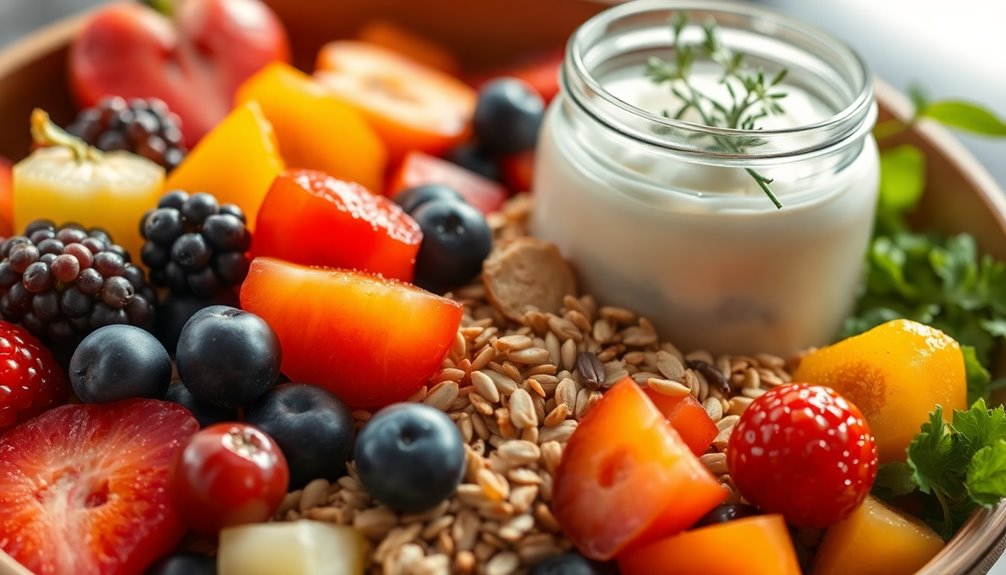Prebiotics play a vital role in enhancing probiotic effectiveness by nourishing beneficial gut bacteria. These non-digestible fibers, found in foods like garlic and bananas, fuel probiotics and promote their growth. By increasing the diversity of your gut microbiota, prebiotics support digestion and bolster your immune response. Studies show that a diet rich in prebiotics can lead to improved gut health and reduced gastrointestinal issues. Additionally, combining prebiotics and probiotics maximizes health benefits, creating a synergistic effect. To fully understand how to optimize your gut health, there's much more you'll want to explore beyond this introduction.
Key Takeaways
- Prebiotics provide essential nutrients that nourish and stimulate the growth of beneficial probiotics in the gut.
- The fermentation of prebiotics produces short-chain fatty acids, which enhance the survival and activity of probiotic strains.
- A diverse intake of prebiotic fibers increases gut microbiota diversity, creating a favorable environment for probiotics to thrive.
- Combining prebiotics and probiotics improves digestion and reduces gastrointestinal issues more effectively than either alone.
- Prebiotics enhance the immune response, supporting overall gut health and optimizing the benefits of probiotics.
Understanding Prebiotics
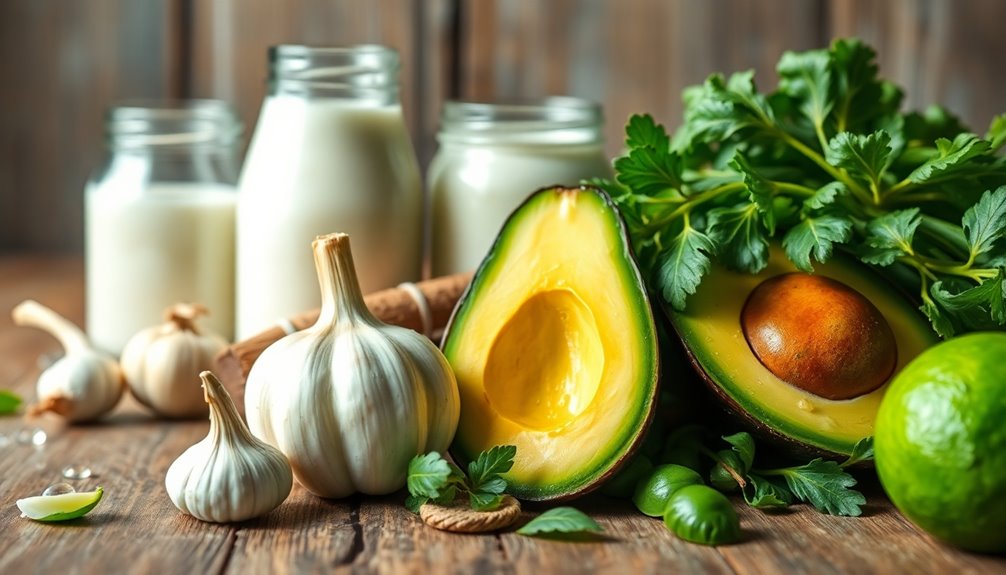
Understanding prebiotics is fundamental for optimizing the benefits of probiotics in your gut health regimen. Prebiotics are non-digestible fibers that serve as food for beneficial gut bacteria, enhancing their growth and activity. By directly influencing the composition of your gut microbiota, prebiotics play an important role in maintaining a balanced intestinal ecosystem.
When you consume prebiotic-rich foods or supplements, you're promoting the proliferation of probiotics, which can improve digestion, bolster immune function, and even enhance mood. Foods such as garlic, onions, and bananas are excellent sources of prebiotics, but many people turn to prebiotic supplements for convenience and targeted benefits. These supplements often contain ingredients like inulin or fructooligosaccharides, which have been shown to stimulate the growth of health-promoting bacteria like Bifidobacteria and Lactobacilli.
Furthermore, understanding prebiotic functions can help you make informed choices about your diet. Research indicates that a diet rich in prebiotics can lead to improved gut health markers and a reduced risk of gastrointestinal disorders. Additionally, a plant-based diet can be particularly beneficial, as it is rich in prebiotic sources, helping to support gut health. By incorporating prebiotics into your routine, you'll not only support the effectiveness of the probiotics you're taking but also foster a healthier microbiome overall.
The Symbiotic Relationship

The symbiotic relationship between prebiotics and probiotics is an important aspect of gut health that can't be ignored. When you consume prebiotics, you're essentially providing nourishment for the beneficial bacteria in your gut microbiota. This dynamic fosters a flourishing environment where probiotics can thrive, enhancing their effectiveness in promoting gut health. Research shows that a balanced gut microbiota plays a key role in maintaining not just digestive health but also overall well-being.
As these probiotics consume the prebiotics, they ferment them into short-chain fatty acids, which can positively impact your immune system. This interaction boosts the production of protective compounds that enhance the gut barrier function, making it more resilient against pathogens. A healthy gut microbiota is linked to a well-functioning immune response, reducing the risk of infections and inflammatory conditions.
Moreover, studies indicate that prebiotics can increase the diversity of your gut microbiota, which is crucial for a strong immune system. The greater the variety of beneficial bacteria present, the more adaptable your immune response can be. By nurturing this symbiotic relationship, you're not just supporting digestion; you're actively participating in maintaining your health. Additionally, adopting a Keto diet can offer benefits such as improved digestion and reduced cravings, which may further support gut health.
Incorporating prebiotics into your diet alongside probiotics creates a harmonious balance. This synergy not only optimizes the benefits of each but also fosters a sense of belonging to the community of health-conscious individuals invested in their well-being.
How Prebiotics Support Probiotics
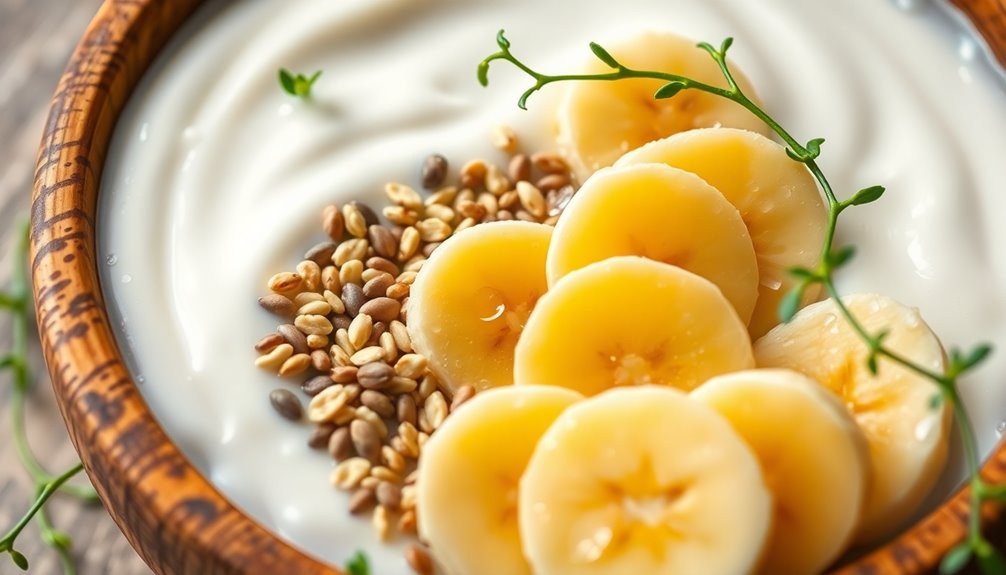
By providing necessary nutrients, prebiotics greatly enhance the effectiveness of probiotics in the gut. When you consume prebiotics, you're essentially nourishing the beneficial bacteria that probiotics introduce. This nourishment supports their growth and activity, leading to improved gut health and a more balanced microbiome. The synergy between prebiotics and probiotics is essential for maintaining ideal digestive function and overall well-being. Additionally, just as a fall-prevention ritual can revitalize stability and balance in older adults, prebiotics can similarly boost the health and activity of probiotics in your gut.
Here's a quick look at how prebiotics support probiotics:
| Aspect | Prebiotics | Probiotics |
|---|---|---|
| Function | Nourish beneficial bacteria | Introduce beneficial bacteria |
| Impact on Gut Health | Improve digestive health | Restore microbiome balance |
| Long-term Benefits | Promote sustained gut health | Enhance immune response |
Research shows that when prebiotics are present, probiotics can thrive and exert their positive effects more effectively. This combination not only improves digestion but also influences mood and immunity by fostering a healthy gut ecosystem.
Moreover, by regularly including prebiotic-rich foods in your diet, you help maintain microbiome balance, which is vital for optimal health. As you embrace this knowledge, you might feel more connected to a community that values gut health and wellness. By understanding how prebiotics support probiotics, you're taking a significant step toward enhancing your digestive health and overall well-being.
Types of Prebiotics

Numerous types of prebiotics exist, each playing a unique role in nurturing gut health. You might be surprised to learn that prebiotic fibers form the backbone of many prebiotic supplements. These fibers, such as inulin and oligofructose, serve as food for beneficial gut bacteria, promoting their growth and activity. Research shows that these fermentable fibers can enhance the effectiveness of probiotics, leading to improved digestive health and overall well-being.
Another significant category of prebiotics includes resistant starches, which resist digestion in the small intestine and ferment in the colon. This fermentation process generates short-chain fatty acids, essential for maintaining gut barrier function and reducing inflammation. You'll find resistant starches in foods like green bananas and cooked, cooled potatoes. Incorporating these into your diet can further support the probiotics you're taking.
Moreover, you should consider galacto-oligosaccharides (GOS) and fructo-oligosaccharides (FOS), both of which naturally occur in various foods. They've been shown to selectively stimulate the growth of beneficial bacteria, enhancing the overall microbial diversity in your gut. Additionally, understanding how to optimize daily rhythms can further support your gut health by ensuring your body is in a balanced state to absorb nutrients effectively.
Choosing the right prebiotic supplements can make a significant impact on how effectively your probiotics work. By understanding these types of prebiotics, you can better tailor your dietary choices and supplementation to foster a thriving gut environment, ultimately supporting your health journey. Embracing these insights helps you feel more connected to your well-being and the community of health-conscious individuals around you.
Food Sources of Prebiotics
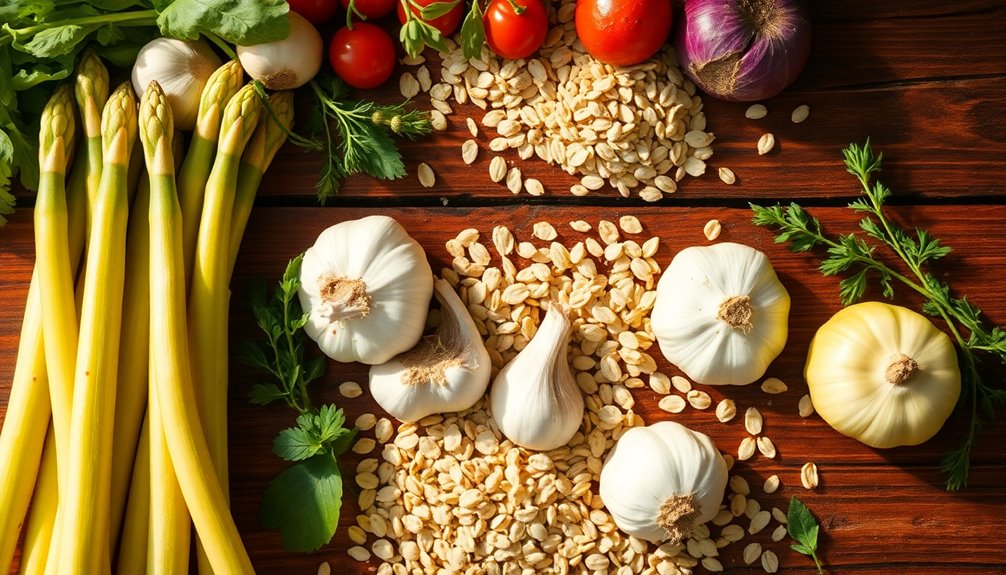
Prebiotics are abundant in various foods that you might already enjoy, making it easier to incorporate them into your diet. These non-digestible fibers play an essential role in supporting gut health by serving as food for beneficial bacteria. You'll find prebiotic fibers in several common foods, enabling you to enhance your diet without significant changes.
Foods rich in prebiotic fibers include fruits like bananas, apples, and berries. Bananas, particularly when they're slightly green, contain resistant starch, which acts as a prebiotic. Vegetables such as leeks, onions, and garlic are also excellent sources. These allium vegetables contain inulin, a type of prebiotic fiber known for its gut health benefits. Whole grains like oats and barley contribute as well, providing not just prebiotics but also essential nutrients.
Legumes, including lentils, chickpeas, and beans, are powerhouse sources of prebiotic fibers. They're versatile and can easily be added to various dishes, contributing to both your gut health and overall nutrition. Nuts and seeds, particularly almonds and flaxseeds, also offer prebiotic benefits while providing healthy fats. Additionally, it's essential to be mindful of the negative effects of traditional bread on gut health, as they can disrupt the balance of beneficial bacteria.
Incorporating these foods into your meals can be a simple yet effective way to boost your intake of prebiotic fibers. By making conscious choices to include these items in your diet, you're taking proactive steps toward supporting your gut health, fostering a flourishing environment for probiotics to thrive.
Benefits of Prebiotics
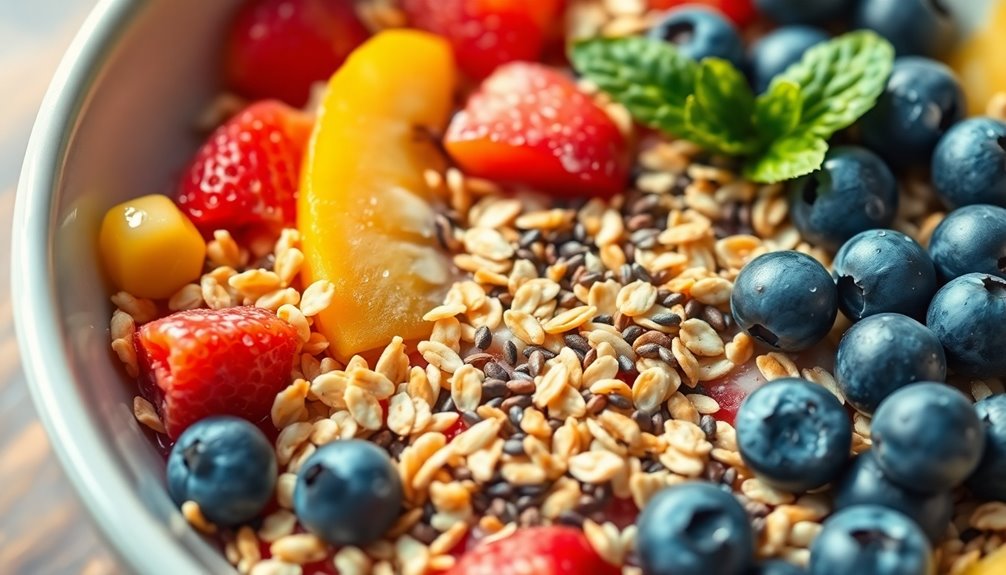
A growing body of research highlights the numerous benefits of prebiotics for gut health and overall well-being. These unique fibers serve as food for your beneficial gut bacteria, promoting a thriving microbiome and enhancing your health in several essential ways.
- Improved Digestion: Prebiotics can help regulate bowel movements, reducing constipation and discomfort. A balanced gut fosters better nutrient absorption, making you feel more energized.
- Enhanced Immune System: By supporting the growth of beneficial bacteria, prebiotics can bolster your immune system, helping your body ward off infections and illnesses more effectively.
- Reduced Inflammation: Studies show that prebiotics can lower inflammation levels in the gut, which may alleviate symptoms of inflammatory bowel diseases and improve overall gut health.
- Better Mood and Mental Health: Emerging research links gut health to mental well-being, suggesting that a healthy gut can positively impact your mood and reduce feelings of anxiety. Additionally, the health benefits of natural neuropathy relief can further support emotional well-being.
Incorporating prebiotics into your diet not only enhances the effectiveness of probiotics but also creates a supportive environment for your gut microbiome. By nurturing your gut health, you're investing in your immune system and overall essentiality.
When you prioritize prebiotics, you're taking a step towards a healthier, more balanced life. Embracing these benefits fosters a sense of belonging to a community that values wellness and self-care.
Recommended Daily Intake
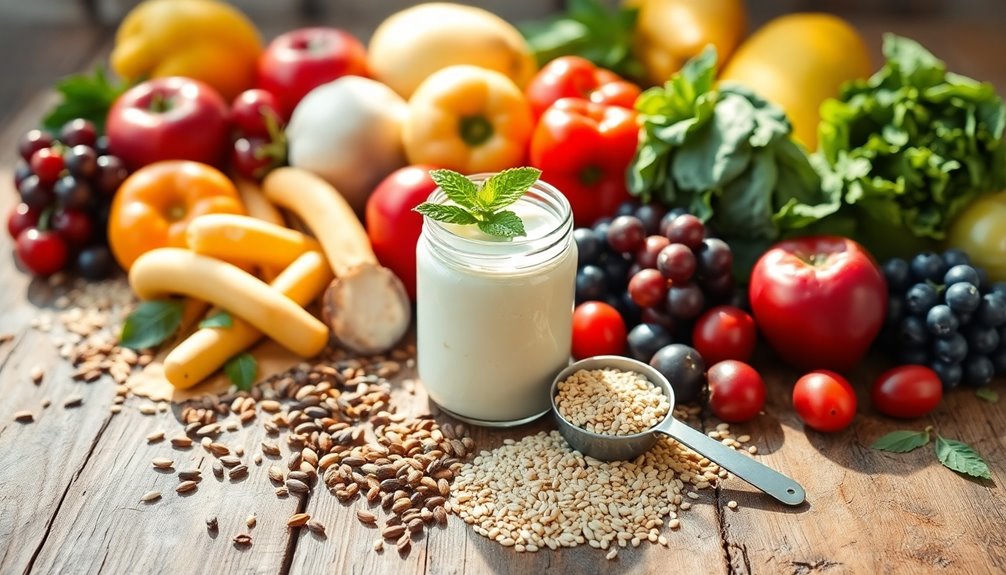
Determining the right amount of prebiotics to include in your daily diet is essential for maximizing their health benefits. Research suggests that a daily intake of 3 to 10 grams of prebiotics can greatly boost gut health and enhance the effectiveness of probiotics. This range helps foster a thriving environment for beneficial gut bacteria, which can lead to improved digestion and overall wellness.
If you're considering prebiotic supplements, it's important to choose high-quality products that specify their prebiotic content. Many supplements contain inulin, fructooligosaccharides (FOS), or galactooligosaccharides (GOS), all of which have shown promise in promoting gut health. However, individual responses can vary based on factors such as your diet, gut microbiome composition, and overall health status.
You might start with the lower end of the recommended intake and gradually increase it to allow your digestive system to adjust. Monitoring your body's response is vital; some people may experience mild digestive discomfort if they suddenly increase their prebiotic intake too quickly.
Incorporating prebiotics naturally through foods like garlic, onions, bananas, and whole grains is another effective strategy. This not only provides a diverse range of nutrients but also enhances your connection to wholesome eating practices. Ultimately, achieving the right balance of prebiotics in your diet can greatly influence your gut health, making it a worthwhile endeavor in your journey toward better wellness.
Prebiotics and Digestive Health
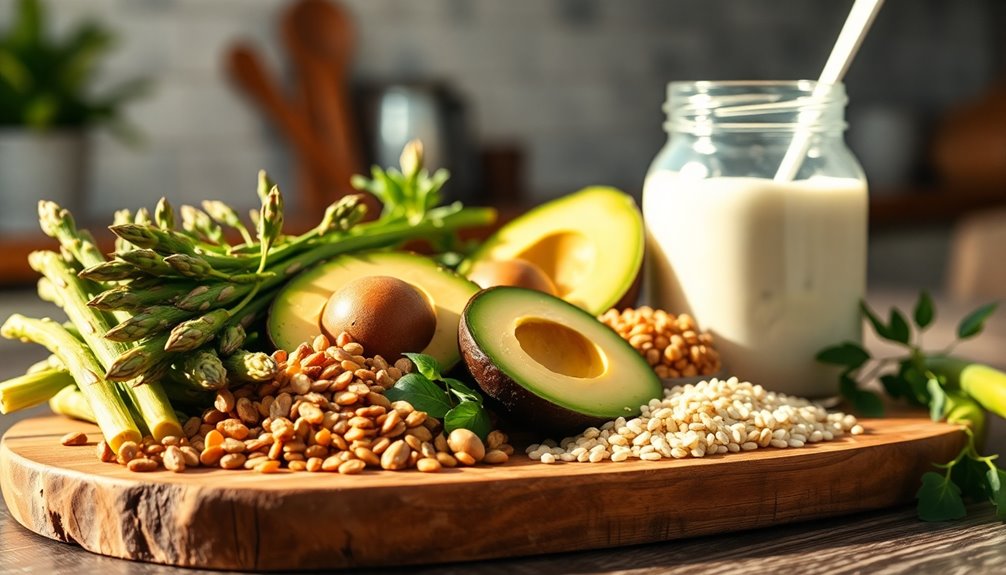
How do prebiotics support digestive health? Prebiotics play a pivotal role in nourishing your gut microbiota, the diverse community of microorganisms in your digestive system. By enhancing the growth of beneficial bacteria, prebiotics can help balance your gut, leading to improved digestive health. Here are four key benefits to keep in mind:
- Enhanced Gut Function: Prebiotics increase fiber intake, which helps regulate bowel movements and prevent constipation.
- Improved Nutrient Absorption: A healthy gut microbiota facilitates better absorption of nutrients, ensuring you get the most from your diet.
- Decreased Digestive Disorders: Prebiotics may lower the risk of gastrointestinal issues, such as bloating and irritable bowel syndrome (IBS), contributing to overall comfort and well-being.
- Strengthened Immune Response: A balanced gut microbiota can strengthen your immune system, helping your body fend off infections and illnesses.
Research shows that specific types of prebiotics, like inulin and fructooligosaccharides, notably enhance gut health. By increasing your fiber intake through prebiotics, you're not just supporting beneficial bacteria; you're fostering an environment that promotes digestive harmony. Additionally, a healthy diet that includes prebiotics can support recovery from alcohol use disorder, which may lead to improved gut health.
When you prioritize prebiotics in your diet, you're investing in your gut health and, ultimately, your overall well-being. Remember, a balanced gut microbiota is essential for feeling your best, and prebiotics are a crucial component of that balance. Embracing prebiotics can lead you toward a healthier, more vibrant life.
Incorporating Prebiotics in Your Diet

Integrating prebiotics into your diet can greatly enhance your gut health and overall well-being. Prebiotics act as food for beneficial gut bacteria, promoting their growth and activity. This relationship is vital because a balanced gut microbiome can improve digestion, boost immunity, and even influence mood. Additionally, incorporating mind/body exercises can further support overall health, including blood pressure management.
To experience these advantages, you can start by including prebiotic-rich recipes in your daily meals. Foods like garlic, onions, asparagus, and bananas are exceptional sources of prebiotics. Including these ingredients in your cooking can be both enjoyable and rewarding.
If you find it challenging to get enough prebiotics through food alone, consider prebiotic supplements. These can provide a concentrated dose of prebiotic fibers, ensuring you're meeting your dietary needs. However, it's crucial to choose high-quality supplements and consult with a healthcare professional before adding them to your routine.
Start simple by adding a tablespoon of inulin powder to your morning smoothie or sprinkling some ground flaxseed on your yogurt. You could also experiment with prebiotic-rich recipes, like a delectable asparagus soup or a hearty bean salad, to make your meals more gut-friendly.
Making these small changes can lead to significant improvements in your digestive health. By fostering a thriving gut microbiome, you're not just enhancing your physical health—you're also nurturing a sense of community with others who prioritize wellness. So, embrace prebiotics in your diet, and enjoy the journey toward better gut health together.
Frequently Asked Questions
Can Prebiotics Be Harmful in Excessive Amounts?
Yes, prebiotics can be harmful in excessive amounts. While they're essential for a healthy gut microbiome, too much can lead to gastrointestinal discomfort, including bloating and gas. Your fiber intake should be balanced; overdoing it can disrupt your digestive system.
It's vital to listen to your body and adjust your diet accordingly. Moderation is key to maintaining a thriving gut environment while enjoying the benefits of prebiotics without adverse effects.
Are There Any Side Effects of Taking Prebiotics?
Imagine your stomach as a bustling city; prebiotics can act like construction crews, improving the infrastructure. However, if you overdo it, you might experience digestive discomfort, like blocked roads and detours. This can lead to gas, bloating, or even cramping.
Additionally, excessive intake can hinder nutrient absorption, preventing your body from fully benefiting from its food. So, while prebiotics are beneficial, moderation is key to keeping your digestive city running smoothly.
How Long Does It Take to See Results From Prebiotics?
When you begin incorporating prebiotics, you might observe results within a few days to a couple of weeks, depending on your ideal dosage and individual reaction. Some individuals notice enhancements in digestion or energy levels earlier, while others may require more time.
Paying attention to your body and modifying your consumption according to your well-being is crucial. Consistency is vital, so persist with it for the greatest possibility of experiencing beneficial changes.
Can Prebiotics Replace the Need for Probiotics?
You might wonder if prebiotics can completely replace probiotics. While prebiotics support gut health by nourishing beneficial bacteria and promoting microbiome balance, they don't provide live microorganisms like probiotics do. Both are essential for a healthy gut.
Prebiotics enhance the effectiveness of probiotics but don't substitute their roles. To achieve peak gut health, it's best to incorporate both into your diet. That way, you'll foster a thriving microbiome and overall wellness.
Are Prebiotics Suitable for Everyone, Including Children and Pregnant Women?
While prebiotics might seem like a friendly addition to everyone's diet, safety concerns do arise, particularly for children and pregnant women. It's essential you consult a healthcare professional to guarantee ideal dosages, as individual sensitivities can vary.
Evidence suggests that, when used appropriately, prebiotics can benefit many, but they aren't universally suitable for all. Prioritize your health and well-being by making informed choices tailored to your unique needs and circumstances.
Conclusion
In the intricate garden of gut health, prebiotics act as the essential soil nourishing the seeds of probiotics. By enhancing their effectiveness, prebiotics cultivate a thriving microbiome, leading to improved digestion and overall wellness. Embracing a diet rich in prebiotics is like watering that garden; it fosters a flourishing community of beneficial bacteria. As you incorporate these crucial nutrients into your meals, you're not just feeding your body but nurturing the very foundation of your health.

